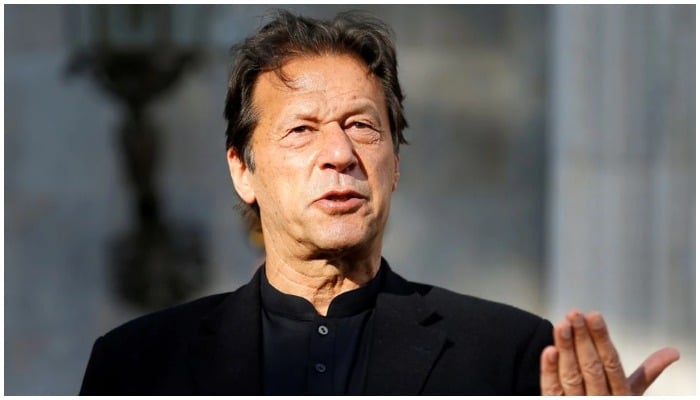The vote of no-confidence has given Imran Khan a lifeline
Khan's party has closed ranks and is now stronger in bond than before, as his close aides [...] are giving opposition a tough time to govern
April 20, 2022

By March 7, former Prime Minister Imran Khan’s popularity was at an all-time low, due to the unprecedented inflation and the political uncertainty in the country.
Khan’s government was in panic mode. The results from the by-elections, and the first phase of local bodies polls in Khyber Pakhtunkhwa, had shown the writing on the wall. Khan quickly dissolved all party organisations to start afresh.
Then came March 8, when the vote of no-confidence was submitted by a combined opposition against him. And just like that, Khan managed to turn the tables in his favour.
After removing Imran Khan from office, nearly 16 months before the next general election, the new coalition government, led by Shehbaz Sharif, is feeling the heat on three accounts: a deteriorating economic situation, pressure to hold an early election and how to deal with the narrative set by Imran Khan about an allegedly US conspiracy to oust him from power.
Sharif has his work cut out for him and he knows. That is why it took him nearly a week to select his team of 33 ministers from over a dozen political parties.
So, it is important to ask then: Was the vote of no-confidence the right decision? And that too this close to the national polls?
One opinion is that the vote has done more damage to the opposition, which is now in power, than to Imran Khan.
But that might not be the entire picture. All was not well in the Khan camp, which has become even clearer now.
For one, he was not on the same page with the establishment, despite claims by his ministers. This was evident during the delay in the appointment of the new intelligence chief last year.
Now Khan says even the appointment of the Chief Election Commissioner was made on the recommendation of the military.
In a talk with television anchors and journalists, he also claims that the three options were proposed by the military to resolve a deadlock between him and the opposition. This is in complete contradiction to what the director-general of the media wing of the military stated recently.
Personally, I believe that removing Khan before his term ended has given the former prime minister a lifeline he needed to boost his morale. His political party has closed ranks and is now stronger in bond than before, as his close aides, such as the governor of Punjab and the president, are giving the opposition a tough time to govern.
Post March 8, Khan’s Pakistan Tehreek-e-Insaf (PTI) has also won the second phase of local bodies in Khyber Pakhtunkhwa, and the recently held by-election on the National Assembly seat in Hangu, even though the candidate had announced that he would resign after winning.
Earlier political observers believed that the party stood little chance in the next polls in Karachi, where PTI won 14 national seats out of 21, and 25 provincial seats in 2018. But now, the PTI is drawing large crowds at rallies in the city.
Its rivals in the city, the Muttahida Qaumi Movement Pakistan, Jamaat-e-Islami, Pakistan People’s Party and even Tehreek-e-Labbaik Pakistan, must be watching PTI’s activities in Karachi very closely.
Khan’s aggressive tone and anti-US narrative have also shaken the Pakistan Muslim League-N (PML-N) in Punjab.
PML-N’s insiders admit that unless their party, and the new government, comes out with a strong counter narrative to the PTI, they could be in trouble in the next polls.
On Thursday, PTI is gearing up to hold a large public rally in Punjab’s capital Lahore, which is being seen as a possible rebirth of the party after October 2011.
Khan is using the same playbook as he did in 2014 when he was in the opposition. First, stage a large rally in Lahore and then he plans to march to Islamabad after Eid.
The purpose is simple: he wants to hit back at the Sharifs and would try to brand them as ‘traitors’ and present himself as a true ‘patriot', using his anti-US card.
Interestingly, April 21 is an important day. It was on this day in 1972 when an interim Constitution was adopted by the parliament, which later became the unanimous Constitution of Pakistan in 1973. And on this day tomorrow, Khan, who violated the Constitution, will hold his gathering.
In a nutshell, it’s practically Imran Khan against all other political parties for now.
The scenario which he is building is being lapped up by his supporters. The narrative he is selling is that all political parties, the establishment, the higher judiciary and the US are against him.
But is this narrative strong enough to win him votes? That will certainly be a challenge no matter how strong his public support is. But if he does win, it will show that his government’s abysmal performance took a back seat to his narrative building.
In my opinion, the vote of no-confidence was a bad political move, and sooner or later these mainstream parties would realise it.
The only option now is to provide major relief to the people in the next two to three months. As they say in cricket, you can only answer your critics through your performance on the ground.











